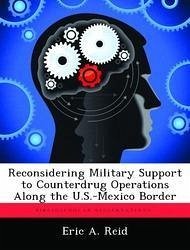Violence perpetrated by Mexican drug trafficking organizations (DTOs) increased dramatically in 2006 and continued to rise dramatically through early 2009. During this same period, Mexican DTO infiltration of U.S. cities skyrocketed. The increase in DTO activity resulted in calls for increased military involvement in counterdrug operations along the U.S. border with Mexico. This thesis examines the history and practice of domestic military support to civilian law enforcement agencies (MSCLEA) for counterdrug operations along the southwest border. Counterdrug MSCLEA was directed by Congress over the objections of senior defense and military officials in the late 1980s and early 1990s. Congressional mandates and defense policies for counterdrug MSCLEA have not been adjusted to incorporate the realities of the North American Free Trade Agreement (NAFTA), the establishment of the Department of Homeland Security (DHS), and the establishment of U.S. Northern Command (USNORTHCOM). This thesis concludes that counterdrug MSCLEA efforts are not necessarily military in nature, have not been effective, are hampered by the requirement to maintain a free flow of trade with Mexico, and prevent the proper resourcing of law enforcement agencies responsible for domestic drug enforcement.







